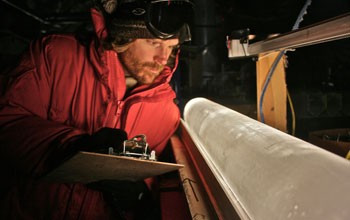Global Warming: World Temperature to Reach 11,300-Year High in 2100

Earth's ambient temperature is hotter now than it has been for most of the last 11,300 years - since the last Ice Age - and will reach a record level by the end of the century.
The planet is warmer now than it has been for between 70 and 80 percent of the last 11 millennia, researchers at Oregon State University and Harvard University have found.
Researchers analysed data from 73 ice and sediment core monitoring sites across the globe, which enabled them to reconstruct Earth's average temperature back to the last Ice Age, a period known as the Holocene.
Shaun Marcoutt, lead author, said their research puts previous studies into a larger context - most research on global warming has focused on the last 2,000 years.
"We already knew that on a global scale, Earth is warmer today than it was over much of the past 2,000 years. Now we know that it is warmer than most of the past 11,300 years," he said.
In 2100, temperatures will be at their highest for the whole of that period, according to projections.
The biggest changes have occurred in the Northern Hemisphere, where there are larger human populations and land masses.

Climate change models suggest that global temperatures will rise another 2F by the end of this century, but that this largely depends on the level of carbon emissions.
Co-author Peter Clark said: "What is most troubling is that this warming will be significantly greater than at any time during the past 11,300 years."
Marcott explained that one of the natural factors affecting Earth's temperature include a change in the distribution of solar insolation, which is linked with the Earth's position in relation to the sun.
"During the warmest period of the Holocene, the Earth was positioned such that Northern Hemisphere summers warmed more," he said.
"As the Earth's orientation changed, Northern Hemisphere summers became cooler, and we should now be near the bottom of this long-term cooling trend - but obviously, we're not."
"The Earth's climate is complex and responds to multiple forcings, including carbon dioxide and solar insolation.
"Both changed very slowly over the past 11,000 years. But in the last 100 years, the increase in carbon dioxide through increased emissions from human activities has been significant.
"It's the only variable that can best explain the rapid increase in global temperatures."
© Copyright IBTimes 2025. All rights reserved.






















